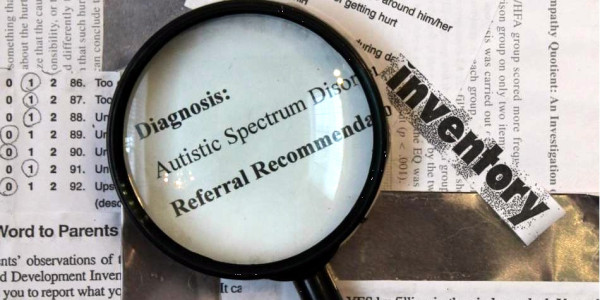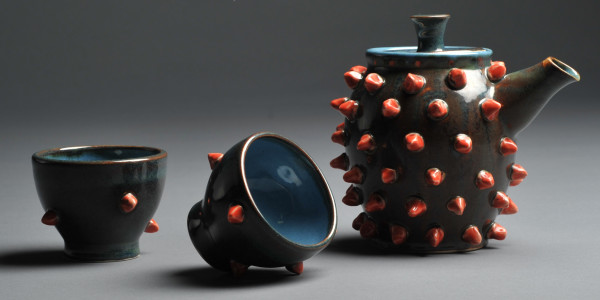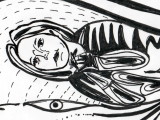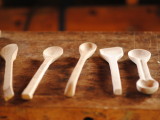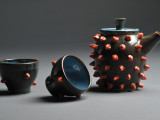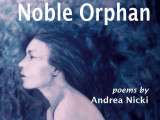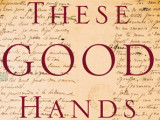Issue 6 (2015): Extraordinary
Extraordinary
in Editorial
Welcome to the “Extraordinary” edition of Understorey Magazine, a diverse collection of stories, poetry, and visual art on mothering through social, physical, and mental challenge. We are excited to publish work by both new and established writers and artists from across Canada and abroad.
Thomas and May
in Creative Nonfiction
Many of May’s typically developing friends fell away on the long march to high school, with its clubs and teams and career paths. Thomas became a hockey player. That’s about all I knew of him. I’d like to say that he asked May to the prom. She didn’t go.
Carmen Is Licking Her Babies
in Fiction
I always do this after work. I come in right off the Access-a-bus and get my pillow and get right in here. We’re all squashed up behind the sofa—me and Carmen and the babies. Mum told me to move away but she doesn’t really know Carmen like I know her.
Shuffle Forward
in Poetry
The child is suddenly silent, / Unresponsive / His face — pasty white and expressionless, / his skin feels cold and moist. / His grey ball cap has been pulled down / so far over his forehead / you can’t see his eyes. / His breathing is shallow and quick. / His pulse is strong....
Supper Helper
in Creative Nonfiction
“Who wants to be supper helper?” I call out, beckoning one of my three teenage kids from behind their closed bedroom doors. I am sitting in my wheelchair and aiming my voice down an empty hallway. It's time for them to choose between setting the table and preparing supper, or cleaning up afterwards.
Star’s Echo
in Creative Nonfiction
As we left the testing room, I joked I had a little mute girl, tossing the term casually around. How long are you going to stay quiet? I joked. She didn’t respond until we re-crossed the threshold of the testing room door. About five minutes, she replied.
Made This Way
in Creative Nonfiction
When my mother's emotions ran high, she ran too. One night about three months after the accident, she slipped out of the house and four hours later, at three in the morning, someone brought her home. They had found her sleeping on a bench down by the bay.
In the Museum of Your Last Day
in Poetry
Tangled sheets, / but no pillow. / A storage basket with broken binders / and unopened packages of lined paper. / The pencil case you fill every September / but never use. / Your dress shoes, / upside down by the closet. / Folded paper squares / rain weed when I open them.
You Call This A Life?
in Creative Nonfiction
If you asked April and Hazel what life is like (with Down syndrome), they would probably give you their undivided attention for a few moments. Hazel would likely start telling you about her friends in school, her little brother Olav, and her favourite foods and activities.
Bradley at the Dinner Table
in Poetry
You don’t want salad. / Your mouth is full of / moist dayglow gobs of / bubble-mint spiderwebs. / You spit them out in your napkin, / slurping an emerald smoothie / I made just for you. / It tastes like gummy bears / you tell me, as you take a sip ....
Baby Steps
in Creative Nonfiction
Zoe aimed the blue tube at the paper and squeezed hard trying to dislodge the dried paint that had sealed the opening after the cap disappeared. The tube split and the paint shot onto the floor, her hands, her clothes, her new pillow. Zoe sat frozen, bright blue streaming down her wrist....
Psychiatric Protocol
in Poetry
Patient reports suicidal ideation. / How often does the patient think of suicide? / 1. If every day, go to question 2. / 2. Does the patient have a suicide plan? If no, go to question 3. Test for personality disorder. / 3. Does the patient exhibit impulsive behaviour ... ?
A Conversation with Carol Bruneau
in Conversation
These Good Hands is Carol Bruneau's sixth novel. Published in May 2015 by Cormorant Books, These Good Hands is a fictionalized biography of nineteenth-century French artist Camille Claudel. The book explores mental illness, misogyny, compassion, and the enduring power of art.
Review: The Brief Reincarnation of a Girl
in Book Review
In The Brief Reincarnation of a Girl (Gaspereau Press, 2015), Nova Scotia poet Sue Goyette delivers a long form poem about a four-year-old Massachusetts girl who died after prolonged exposure to a cocktail of drugs prescribed for bipolar disorder and ADHD.

